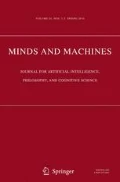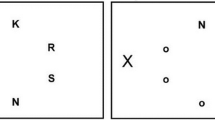Abstract
A working assumption that processes of natural and cultural evolution have tailored the mind to fit the demands and structure of its environment begs the question: how are we to characterize the structure of cognitive environments? Decision problems faced by real organisms are not like simple multiple-choice examination papers. For example, some individual problems may occur much more frequently than others, whilst some may carry much more weight than others. Such considerations are not taken into account when (i) the performance of candidate cognitive mechanisms is assessed by employing a simple accuracy metric that is insensitive to the structure of the decision-maker's environment, and (ii) reason is defined as the adherence to internalist prescriptions of classical rationality. Here we explore the impact of frequency and significance structure on the performance of a range of candidate decision-making mechanisms. We show that the character of this impact is complex, since structured environments demand that decision-makers trade off general performance against performance on important subsets of test items. As a result, environment structure obviates internalist criteria of rationality. Failing to appreciate the role of environment structure in shaping cognition can lead to mischaracterising adaptive behavior as irrational.
Similar content being viewed by others
References
Anderson, J. R. (1991), The Adaptive Character of Thought, Hillsdale, NJ: Lawrence Erlbaum Associates
Blake, C., Keogh, E. and Merz, C. J. (1998), UCI repository of machine learning databases. http://www.ics.uci.edu/_mlearn/MLRepository.html. University of California, Irvine, Dept. of Information and Computer Sciences.
Braitenberg, V. (1984), Vehicles: Experiments in Synthetic Psychology. Cambridge, MA: MIT Press
Brooks, R. A. (1991a), ‘Intelligence without Representation’ Artificial Intelligence 47, pp. 139-159.
Brooks, R. A. (1991b), ‘New Approaches to Robotics’ Science 253, pp. 1227-1232.
Brunswik, E. (1955), ‘Representative Design and Probabilistic Theory in a Functional Psychology’ Psychological Review 62, pp. 193-217.
Cliff, D., Harvey, I. and Husbands, P. (1993), Explorations in Evolutionary Robotics’ Adaptive Behavior 2(1), 71-108.
Clutton-Brock, T. H. and Albon, S. D. (1979), ‘The Roaring of Red Deer and the Evolution of Honest Advertisement’ Behaviour 69, 145-170.
Connolly, T. (1999), ‘Action as a Fast and Frugal Heuristic,’ Minds and Machines, 9, pp. 479-496.
Cosmides, L. and Tooby, J (1987). ‘From Evolution to Behavior: Evolutionary Psychology as the Missing Link’ in J. Dupré, ed., The Latest on The Best: Essays on Evolution and Optimization, Cambridge, MA: MIT Press/Bradford Books, pp. 277-306.
Cummins, D. D. and Allen, C., eds. (1998), The Evolution of Mind, New York: Oxford University Press
Davison, M. and McCarthy, D. (1988), The Matching Law: A Research Review, Hillsdale, NJ: Erlbaum.
Dawes, R. M. (1988), Rational Choice in an Uncertain World. Orlando, FL: Harcourt Brace Jovanovich.
Dawes, R. M. and Corrigan, B. (1974), ‘Linear Models in Decision Making’ Psychological Bulletin, 81, 95-106.
Delius, J. D. and Siemann, M. (1998), ‘Transitive Responding in Animals and Humans: Exaptation Rather than Adaptation?’ Behavioural Processes 42, 107-137.
Evans, J. S. B. T. and Over, D. E. (1996), ‘Rationality in the Selection Task: Epistemic Utility versus Uncertainty Reduction’ Psychological Review 103, 356-363.
Gibson, J. J. (1979), The Ecological Approach to Visual Perception, Boston, MA: Houghton Mifflin.
Gigerenzer, G. and Goldstein, D. G. (1996), ‘Reasoning the Fast and FrugalWay:Models of Bounded Rationality’ Psychological Review 103(4), 650-669.
Gigerenzer, G. and Goldstein, D. G. (1999), ‘Betting on One Good Reason: The Take The Best Heuristic’ in Gigerenzer et al., Simple Heuristics that make Us Smart, pp. 75-96.
Gigerenzer, G., Hoffrage, U. and Kleinbölting, H. (1991), ‘Probabilistic Mental Models: A Brunswikian Theory of Confidence’ Psychological Review 98, 506-528.
Gigerenzer, G., Todd, P. M. and the ABC Group (1999), Simple Heuristics that make Us Smart, New York: Oxford University Press.
Gigerenzer, G. and Todd, P. M. (1999), ‘Fast and Frugal Heuristics: The Adaptive Toolbox’ in Gigerenzer et al., Simple Heuristics that make Us Smart, pp. 3-36.
Goldberg, D. E. (1989) Genetic Algorithms in Search, Optimization and Machine Learning, Reading, MA: Addison-Wesley.
Goldstein, D. G. and Gigerenzer, G. (1999), ‘The Recognition Heuristic: How Ignorance makes Us Smart,’ in Gigerenzer et al., Simple Heuristics that make Us Smart, pp. 37-58.
Goodie, A. S., Ortmann, A., Davis, J. N., Bullock, S. and Werner, G. M. (1999), ‘Demons vs. Heuristics in Artificial Intelligence, Behavioral Ecology, and Economics’ in Gigerenzer et al., Simple Heuristics that make Us Smart, pp. 327-356.
Grafen, A. (1990), ‘Biological Signals as Handicaps’ Journal of Theoretical Biology 144, 517-546.
Hertwig, R., Hoffrage, U. and Martignon, L. (1999), Quick Estimation: Letting the Environment do the Work’ in Gigerenzer et al., Simple Heuristics that make Us Smart, pp. 209-234.
Holland, J. H. (1975), Adaptation in Natural and Artificial Systems, Ann Arbor: University of Michigan Press, (Reprinted by MIT Press, 1992).
Hubel, D. H. and Wiesel, T. N. (1959), ‘Receptive Fields of Single Neurons in the Cat's Striate Cortext’ Journal of Physiology 148, 574-591.
Kahneman, D., Slovic, P. and Tversky, A. (1982), Judgement Under Uncertainty: Heuristics and Biases, New York: Cambridge University Press.
Klauer, K. C. (1999), ‘On the Normative Justification for Information Gain in Wason's Selection Task’ Psychological Review 106, 215-222.
Laplace, P. S. (1951), A Philosophical Essay on Probabilities, New York: Dover (F. W. Truscott and F. L. Emory, Trans.; Original work published 1814).
Marr, D. (1982), Vision, San Francisco, CA: Freeman.
Martignon, L. and Schmitt, M. (1999), ‘Simplicity and Robustness of Fast and Frugal Heuristics’ Minds and Machines, 9, pp. 565-593.
Millikan, R. G. (1984), Language, Thought and Other Biological Categories, Cambridge, MA: MIT Press/Bradford Books.
Millikan, R. G. (1993), White Queen Psychology and Other Essays for Alice, Cambridge, MA: MIT Press/Bradford Books.
Mitchell, M. (1996), An Introduction to Genetic Algorithms, Cambridge, MA: MIT Press/Bradford Books.
Oaksford, M. and Chater, N. (1994), ‘A Rational Analysis of the Selection Task as Optimal Selection’ Psychological Review 101, 608-631.
Oaksford, M. and Chater, N. (1996), ‘Rational Explanation of the Selection Task’ Psychological Review 103, 381-391.
Schick, F. (1986), ‘Dutch Bookies and Money Pumps’ Journal of Philosophy 83, 112-119.
Schlimmer, J. S. (1987), Concept acquisition through representational adjustment. Tech. rep. 87-19, Deptartment of Information and Computer Science, University of California Irvine.
Shafir, S. (1994), ‘Intransitivity of Preferences in Honeybees-Support for Comparative-Evaluation of Foraging Options’ Animal Behaviour 48, 55-67.
Shanteau, J. (1992), ‘Mow much information does an expert use? Is it relevant?’ Acat Psychologica 81, 75-86.
Sober, E. (1994), ‘The Adaptive Advantage of Learning and a priori Prejudice’ in From a Biological Point of View: Essays in Evolutionary Philosophy, Cambridge: Cambridge University Press, pp. 50-70.
Stephens, D.W. and Krebs, J. R. (1986), Foraging Theory, Princeton, NJ: Princeton University Press.
Todd, P. M. and Miller, G. F. (1999), ‘From Pride and Prejudice to Persuasion: Satisficing in Mate Search’ in Gigerenzer et al., Simple Heuristics that make Us Smart, pp. 287-308.
Tversky, A. and Edwards, W. (1966), ‘Information versus Reward in Binary Choice’ Journal of Experimental Psychology 71, 680-683.
Webb, B. (1994), ‘Robotic Experiments in Cricket Phonotaxis’ in D. Cliff, P. Husbands, J.-A. Meyer and S. W. Wilson, eds., From Animals to Animats 3: Proceedings of the Third International Conference on the Simulation of Adaptive Behavior, Cambridge, MA: MIT Press. pp. 45-54.
Webb, B. (1996), ‘A robot cricket’ Science 275, 62-67.
Williams, B. A. (1988), Reinforcement, Choice, and Response Strength’ in R. C. Atkinson, R. J. Herrnstein, G. Lindzey and R. D. Luce, eds., Stevens' Handbook of Experimental Psychology, New York: Wiley, pp. 167-244.
Author information
Authors and Affiliations
Rights and permissions
About this article
Cite this article
Bullock, S., Todd, P.M. Made to Measure: Ecological Rationality in Structured Environments. Minds and Machines 9, 497–541 (1999). https://doi.org/10.1023/A:1008352717581
Issue Date:
DOI: https://doi.org/10.1023/A:1008352717581



